Impact of Religion on International Relations and Cybersecurity
VerifiedAdded on 2023/01/18
|11
|2697
|94
Essay
AI Summary
This essay critically analyzes the multifaceted impact of religion on international relations and cybersecurity. It begins by establishing the historical and contemporary significance of religion in shaping global interactions, including the formation of alliances and the influence on national policies. The essay then delves into the ways religious extremism contributes to cybersecurity threats, exploring how religious motivations drive cyberattacks and influence the nature of these threats. Furthermore, it examines the role of religion in shaping international relations, highlighting the influence of religious similarities and differences on diplomatic ties and global conflicts, particularly in the context of Middle Eastern nations. The essay also discusses how religious intolerance and extremism exacerbate cybersecurity risks, emphasizing the need for tolerance and understanding to mitigate these challenges. Finally, the essay concludes by summarizing the ways religion affects international relations and cybersecurity, emphasizing the importance of addressing religious factors in these critical areas. The essay provides a comprehensive overview of the complex interplay between religion, international relations, and cybersecurity, drawing upon diverse perspectives to offer a nuanced understanding of the subject.
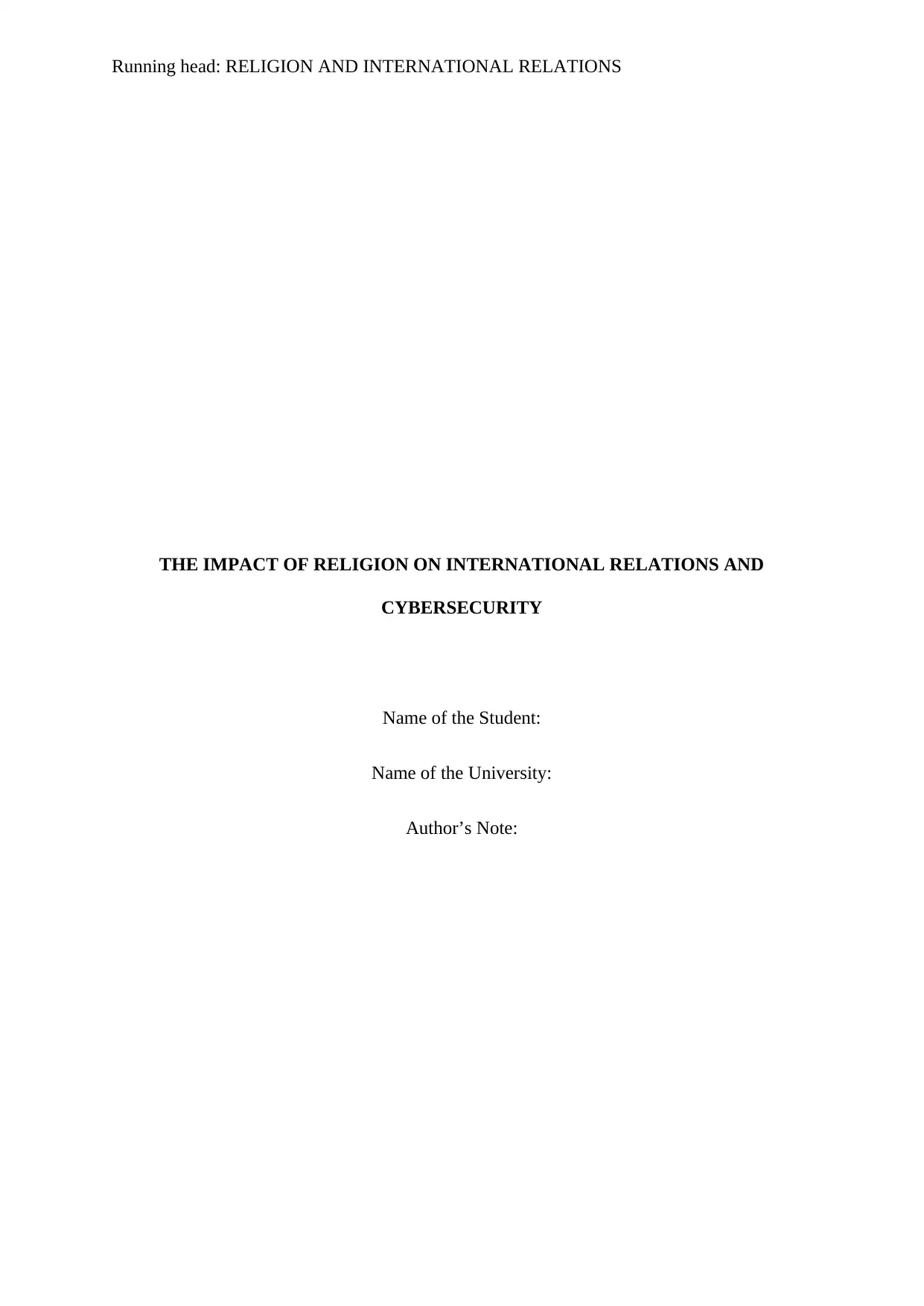
Running head: RELIGION AND INTERNATIONAL RELATIONS
THE IMPACT OF RELIGION ON INTERNATIONAL RELATIONS AND
CYBERSECURITY
Name of the Student:
Name of the University:
Author’s Note:
THE IMPACT OF RELIGION ON INTERNATIONAL RELATIONS AND
CYBERSECURITY
Name of the Student:
Name of the University:
Author’s Note:
Paraphrase This Document
Need a fresh take? Get an instant paraphrase of this document with our AI Paraphraser
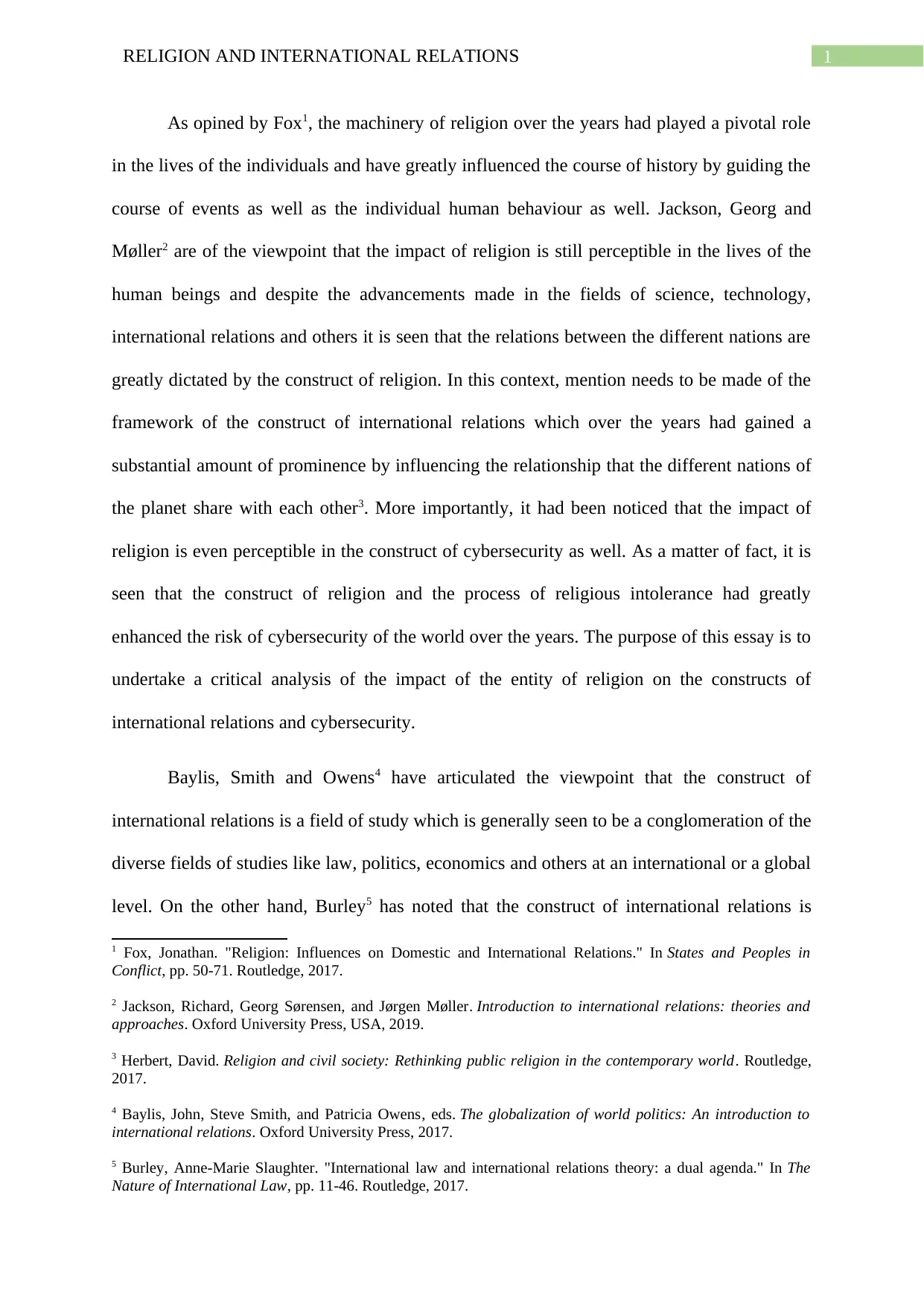
1RELIGION AND INTERNATIONAL RELATIONS
As opined by Fox1, the machinery of religion over the years had played a pivotal role
in the lives of the individuals and have greatly influenced the course of history by guiding the
course of events as well as the individual human behaviour as well. Jackson, Georg and
Møller2 are of the viewpoint that the impact of religion is still perceptible in the lives of the
human beings and despite the advancements made in the fields of science, technology,
international relations and others it is seen that the relations between the different nations are
greatly dictated by the construct of religion. In this context, mention needs to be made of the
framework of the construct of international relations which over the years had gained a
substantial amount of prominence by influencing the relationship that the different nations of
the planet share with each other3. More importantly, it had been noticed that the impact of
religion is even perceptible in the construct of cybersecurity as well. As a matter of fact, it is
seen that the construct of religion and the process of religious intolerance had greatly
enhanced the risk of cybersecurity of the world over the years. The purpose of this essay is to
undertake a critical analysis of the impact of the entity of religion on the constructs of
international relations and cybersecurity.
Baylis, Smith and Owens4 have articulated the viewpoint that the construct of
international relations is a field of study which is generally seen to be a conglomeration of the
diverse fields of studies like law, politics, economics and others at an international or a global
level. On the other hand, Burley5 has noted that the construct of international relations is
1 Fox, Jonathan. "Religion: Influences on Domestic and International Relations." In States and Peoples in
Conflict, pp. 50-71. Routledge, 2017.
2 Jackson, Richard, Georg Sørensen, and Jørgen Møller. Introduction to international relations: theories and
approaches. Oxford University Press, USA, 2019.
3 Herbert, David. Religion and civil society: Rethinking public religion in the contemporary world. Routledge,
2017.
4 Baylis, John, Steve Smith, and Patricia Owens, eds. The globalization of world politics: An introduction to
international relations. Oxford University Press, 2017.
5 Burley, Anne-Marie Slaughter. "International law and international relations theory: a dual agenda." In The
Nature of International Law, pp. 11-46. Routledge, 2017.
As opined by Fox1, the machinery of religion over the years had played a pivotal role
in the lives of the individuals and have greatly influenced the course of history by guiding the
course of events as well as the individual human behaviour as well. Jackson, Georg and
Møller2 are of the viewpoint that the impact of religion is still perceptible in the lives of the
human beings and despite the advancements made in the fields of science, technology,
international relations and others it is seen that the relations between the different nations are
greatly dictated by the construct of religion. In this context, mention needs to be made of the
framework of the construct of international relations which over the years had gained a
substantial amount of prominence by influencing the relationship that the different nations of
the planet share with each other3. More importantly, it had been noticed that the impact of
religion is even perceptible in the construct of cybersecurity as well. As a matter of fact, it is
seen that the construct of religion and the process of religious intolerance had greatly
enhanced the risk of cybersecurity of the world over the years. The purpose of this essay is to
undertake a critical analysis of the impact of the entity of religion on the constructs of
international relations and cybersecurity.
Baylis, Smith and Owens4 have articulated the viewpoint that the construct of
international relations is a field of study which is generally seen to be a conglomeration of the
diverse fields of studies like law, politics, economics and others at an international or a global
level. On the other hand, Burley5 has noted that the construct of international relations is
1 Fox, Jonathan. "Religion: Influences on Domestic and International Relations." In States and Peoples in
Conflict, pp. 50-71. Routledge, 2017.
2 Jackson, Richard, Georg Sørensen, and Jørgen Møller. Introduction to international relations: theories and
approaches. Oxford University Press, USA, 2019.
3 Herbert, David. Religion and civil society: Rethinking public religion in the contemporary world. Routledge,
2017.
4 Baylis, John, Steve Smith, and Patricia Owens, eds. The globalization of world politics: An introduction to
international relations. Oxford University Press, 2017.
5 Burley, Anne-Marie Slaughter. "International law and international relations theory: a dual agenda." In The
Nature of International Law, pp. 11-46. Routledge, 2017.
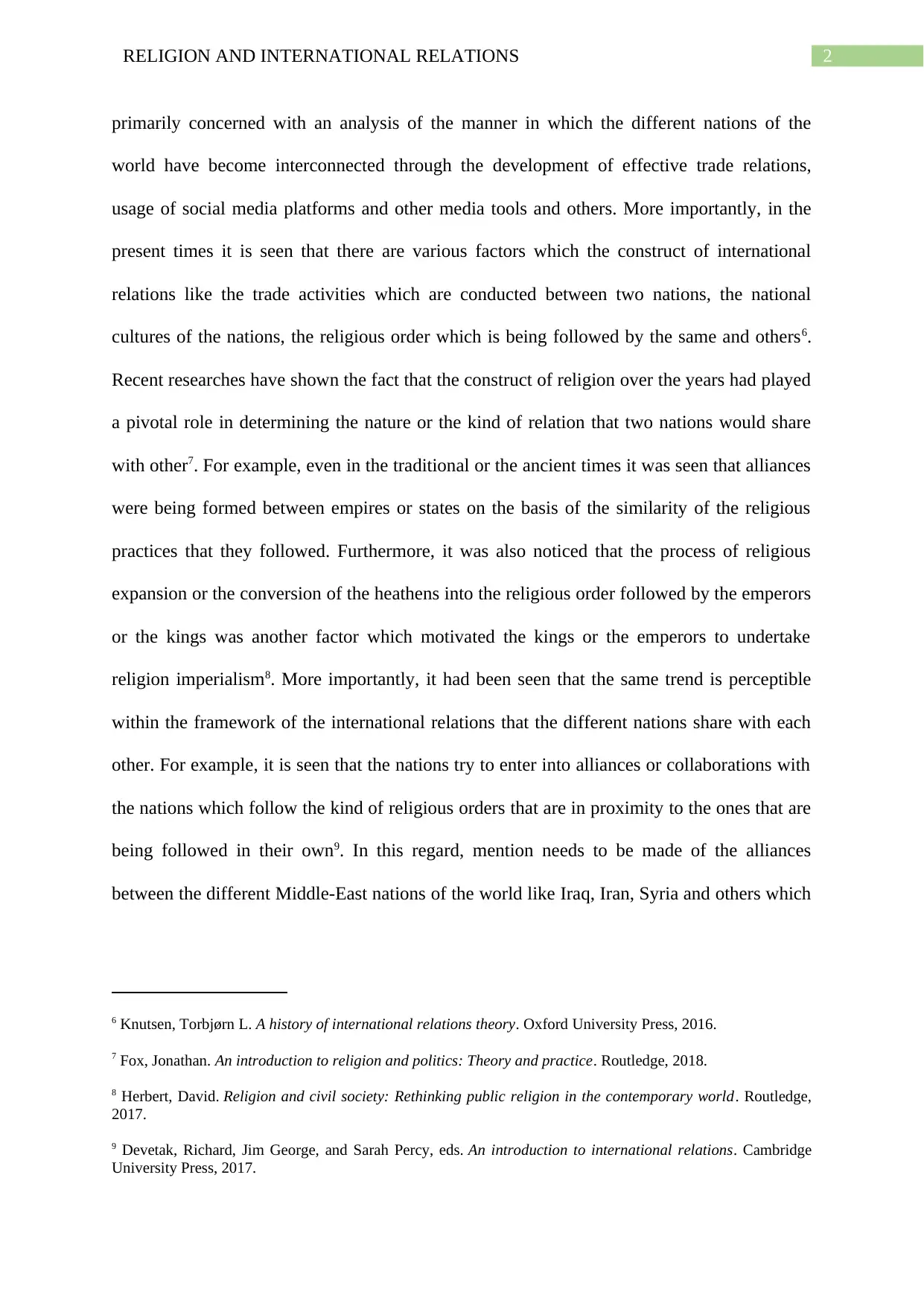
2RELIGION AND INTERNATIONAL RELATIONS
primarily concerned with an analysis of the manner in which the different nations of the
world have become interconnected through the development of effective trade relations,
usage of social media platforms and other media tools and others. More importantly, in the
present times it is seen that there are various factors which the construct of international
relations like the trade activities which are conducted between two nations, the national
cultures of the nations, the religious order which is being followed by the same and others6.
Recent researches have shown the fact that the construct of religion over the years had played
a pivotal role in determining the nature or the kind of relation that two nations would share
with other7. For example, even in the traditional or the ancient times it was seen that alliances
were being formed between empires or states on the basis of the similarity of the religious
practices that they followed. Furthermore, it was also noticed that the process of religious
expansion or the conversion of the heathens into the religious order followed by the emperors
or the kings was another factor which motivated the kings or the emperors to undertake
religion imperialism8. More importantly, it had been seen that the same trend is perceptible
within the framework of the international relations that the different nations share with each
other. For example, it is seen that the nations try to enter into alliances or collaborations with
the nations which follow the kind of religious orders that are in proximity to the ones that are
being followed in their own9. In this regard, mention needs to be made of the alliances
between the different Middle-East nations of the world like Iraq, Iran, Syria and others which
6 Knutsen, Torbjørn L. A history of international relations theory. Oxford University Press, 2016.
7 Fox, Jonathan. An introduction to religion and politics: Theory and practice. Routledge, 2018.
8 Herbert, David. Religion and civil society: Rethinking public religion in the contemporary world. Routledge,
2017.
9 Devetak, Richard, Jim George, and Sarah Percy, eds. An introduction to international relations. Cambridge
University Press, 2017.
primarily concerned with an analysis of the manner in which the different nations of the
world have become interconnected through the development of effective trade relations,
usage of social media platforms and other media tools and others. More importantly, in the
present times it is seen that there are various factors which the construct of international
relations like the trade activities which are conducted between two nations, the national
cultures of the nations, the religious order which is being followed by the same and others6.
Recent researches have shown the fact that the construct of religion over the years had played
a pivotal role in determining the nature or the kind of relation that two nations would share
with other7. For example, even in the traditional or the ancient times it was seen that alliances
were being formed between empires or states on the basis of the similarity of the religious
practices that they followed. Furthermore, it was also noticed that the process of religious
expansion or the conversion of the heathens into the religious order followed by the emperors
or the kings was another factor which motivated the kings or the emperors to undertake
religion imperialism8. More importantly, it had been seen that the same trend is perceptible
within the framework of the international relations that the different nations share with each
other. For example, it is seen that the nations try to enter into alliances or collaborations with
the nations which follow the kind of religious orders that are in proximity to the ones that are
being followed in their own9. In this regard, mention needs to be made of the alliances
between the different Middle-East nations of the world like Iraq, Iran, Syria and others which
6 Knutsen, Torbjørn L. A history of international relations theory. Oxford University Press, 2016.
7 Fox, Jonathan. An introduction to religion and politics: Theory and practice. Routledge, 2018.
8 Herbert, David. Religion and civil society: Rethinking public religion in the contemporary world. Routledge,
2017.
9 Devetak, Richard, Jim George, and Sarah Percy, eds. An introduction to international relations. Cambridge
University Press, 2017.
⊘ This is a preview!⊘
Do you want full access?
Subscribe today to unlock all pages.

Trusted by 1+ million students worldwide
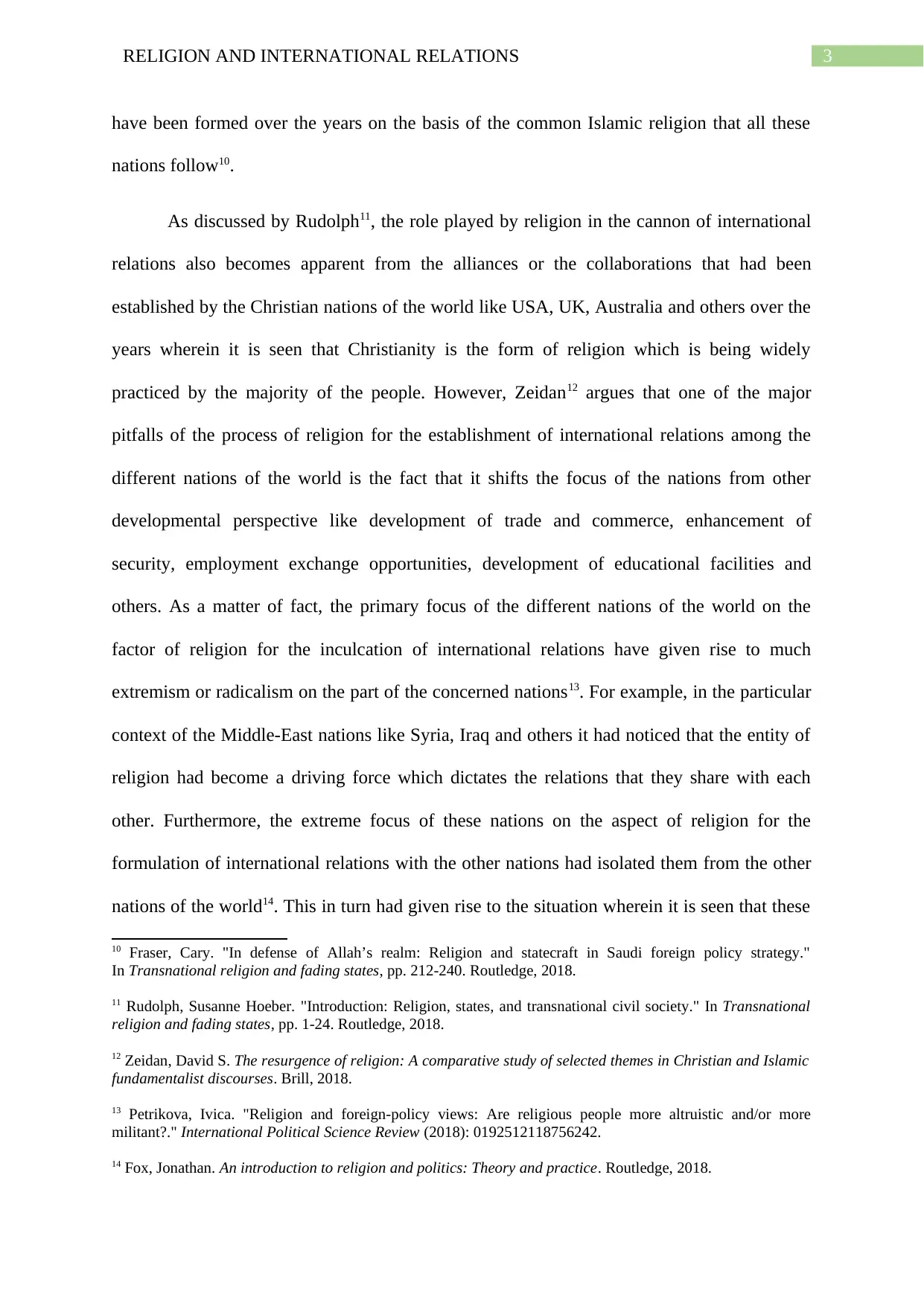
3RELIGION AND INTERNATIONAL RELATIONS
have been formed over the years on the basis of the common Islamic religion that all these
nations follow10.
As discussed by Rudolph11, the role played by religion in the cannon of international
relations also becomes apparent from the alliances or the collaborations that had been
established by the Christian nations of the world like USA, UK, Australia and others over the
years wherein it is seen that Christianity is the form of religion which is being widely
practiced by the majority of the people. However, Zeidan12 argues that one of the major
pitfalls of the process of religion for the establishment of international relations among the
different nations of the world is the fact that it shifts the focus of the nations from other
developmental perspective like development of trade and commerce, enhancement of
security, employment exchange opportunities, development of educational facilities and
others. As a matter of fact, the primary focus of the different nations of the world on the
factor of religion for the inculcation of international relations have given rise to much
extremism or radicalism on the part of the concerned nations13. For example, in the particular
context of the Middle-East nations like Syria, Iraq and others it had noticed that the entity of
religion had become a driving force which dictates the relations that they share with each
other. Furthermore, the extreme focus of these nations on the aspect of religion for the
formulation of international relations with the other nations had isolated them from the other
nations of the world14. This in turn had given rise to the situation wherein it is seen that these
10 Fraser, Cary. "In defense of Allah’s realm: Religion and statecraft in Saudi foreign policy strategy."
In Transnational religion and fading states, pp. 212-240. Routledge, 2018.
11 Rudolph, Susanne Hoeber. "Introduction: Religion, states, and transnational civil society." In Transnational
religion and fading states, pp. 1-24. Routledge, 2018.
12 Zeidan, David S. The resurgence of religion: A comparative study of selected themes in Christian and Islamic
fundamentalist discourses. Brill, 2018.
13 Petrikova, Ivica. "Religion and foreign-policy views: Are religious people more altruistic and/or more
militant?." International Political Science Review (2018): 0192512118756242.
14 Fox, Jonathan. An introduction to religion and politics: Theory and practice. Routledge, 2018.
have been formed over the years on the basis of the common Islamic religion that all these
nations follow10.
As discussed by Rudolph11, the role played by religion in the cannon of international
relations also becomes apparent from the alliances or the collaborations that had been
established by the Christian nations of the world like USA, UK, Australia and others over the
years wherein it is seen that Christianity is the form of religion which is being widely
practiced by the majority of the people. However, Zeidan12 argues that one of the major
pitfalls of the process of religion for the establishment of international relations among the
different nations of the world is the fact that it shifts the focus of the nations from other
developmental perspective like development of trade and commerce, enhancement of
security, employment exchange opportunities, development of educational facilities and
others. As a matter of fact, the primary focus of the different nations of the world on the
factor of religion for the inculcation of international relations have given rise to much
extremism or radicalism on the part of the concerned nations13. For example, in the particular
context of the Middle-East nations like Syria, Iraq and others it had noticed that the entity of
religion had become a driving force which dictates the relations that they share with each
other. Furthermore, the extreme focus of these nations on the aspect of religion for the
formulation of international relations with the other nations had isolated them from the other
nations of the world14. This in turn had given rise to the situation wherein it is seen that these
10 Fraser, Cary. "In defense of Allah’s realm: Religion and statecraft in Saudi foreign policy strategy."
In Transnational religion and fading states, pp. 212-240. Routledge, 2018.
11 Rudolph, Susanne Hoeber. "Introduction: Religion, states, and transnational civil society." In Transnational
religion and fading states, pp. 1-24. Routledge, 2018.
12 Zeidan, David S. The resurgence of religion: A comparative study of selected themes in Christian and Islamic
fundamentalist discourses. Brill, 2018.
13 Petrikova, Ivica. "Religion and foreign-policy views: Are religious people more altruistic and/or more
militant?." International Political Science Review (2018): 0192512118756242.
14 Fox, Jonathan. An introduction to religion and politics: Theory and practice. Routledge, 2018.
Paraphrase This Document
Need a fresh take? Get an instant paraphrase of this document with our AI Paraphraser
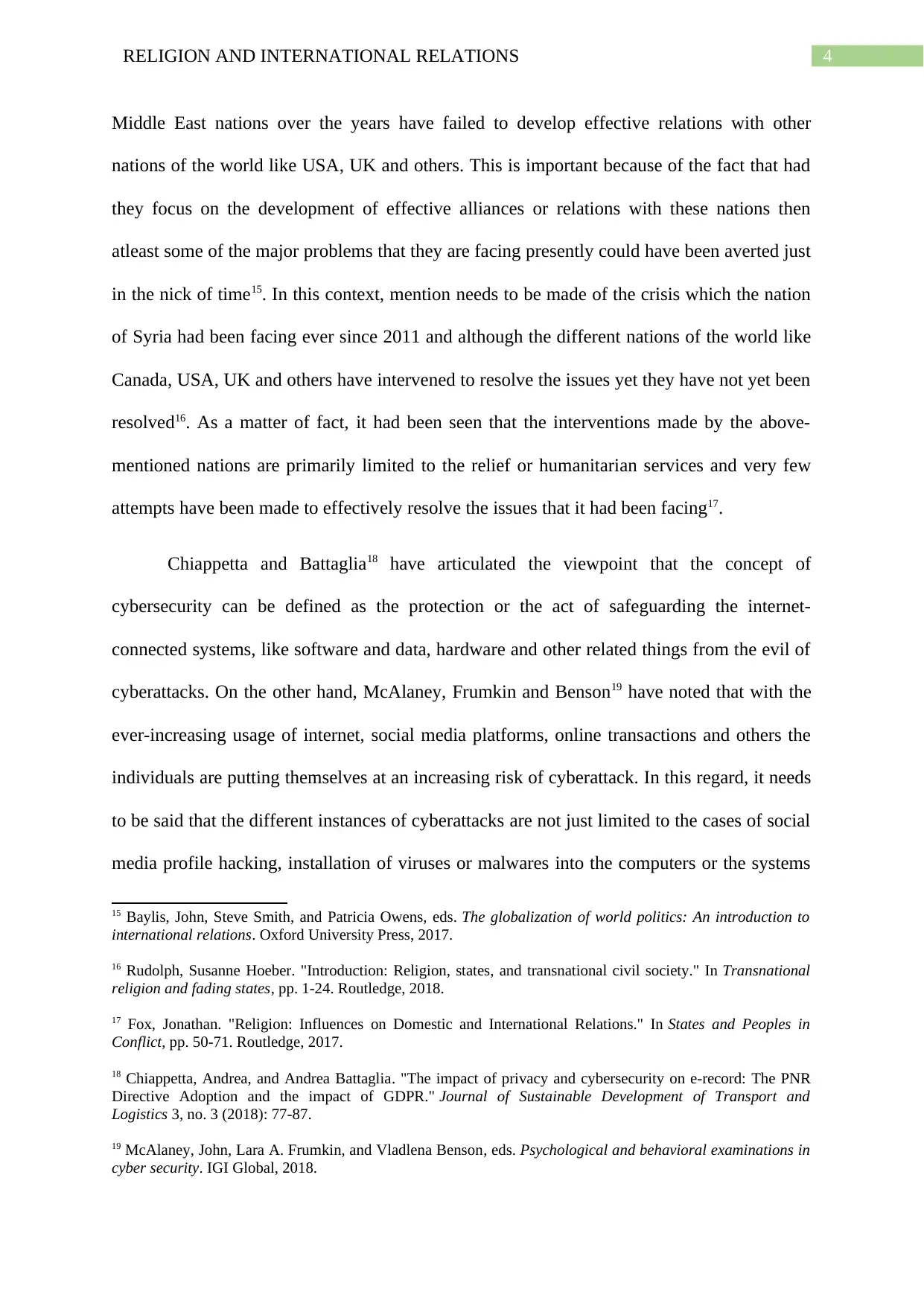
4RELIGION AND INTERNATIONAL RELATIONS
Middle East nations over the years have failed to develop effective relations with other
nations of the world like USA, UK and others. This is important because of the fact that had
they focus on the development of effective alliances or relations with these nations then
atleast some of the major problems that they are facing presently could have been averted just
in the nick of time15. In this context, mention needs to be made of the crisis which the nation
of Syria had been facing ever since 2011 and although the different nations of the world like
Canada, USA, UK and others have intervened to resolve the issues yet they have not yet been
resolved16. As a matter of fact, it had been seen that the interventions made by the above-
mentioned nations are primarily limited to the relief or humanitarian services and very few
attempts have been made to effectively resolve the issues that it had been facing17.
Chiappetta and Battaglia18 have articulated the viewpoint that the concept of
cybersecurity can be defined as the protection or the act of safeguarding the internet-
connected systems, like software and data, hardware and other related things from the evil of
cyberattacks. On the other hand, McAlaney, Frumkin and Benson19 have noted that with the
ever-increasing usage of internet, social media platforms, online transactions and others the
individuals are putting themselves at an increasing risk of cyberattack. In this regard, it needs
to be said that the different instances of cyberattacks are not just limited to the cases of social
media profile hacking, installation of viruses or malwares into the computers or the systems
15 Baylis, John, Steve Smith, and Patricia Owens, eds. The globalization of world politics: An introduction to
international relations. Oxford University Press, 2017.
16 Rudolph, Susanne Hoeber. "Introduction: Religion, states, and transnational civil society." In Transnational
religion and fading states, pp. 1-24. Routledge, 2018.
17 Fox, Jonathan. "Religion: Influences on Domestic and International Relations." In States and Peoples in
Conflict, pp. 50-71. Routledge, 2017.
18 Chiappetta, Andrea, and Andrea Battaglia. "The impact of privacy and cybersecurity on e-record: The PNR
Directive Adoption and the impact of GDPR." Journal of Sustainable Development of Transport and
Logistics 3, no. 3 (2018): 77-87.
19 McAlaney, John, Lara A. Frumkin, and Vladlena Benson, eds. Psychological and behavioral examinations in
cyber security. IGI Global, 2018.
Middle East nations over the years have failed to develop effective relations with other
nations of the world like USA, UK and others. This is important because of the fact that had
they focus on the development of effective alliances or relations with these nations then
atleast some of the major problems that they are facing presently could have been averted just
in the nick of time15. In this context, mention needs to be made of the crisis which the nation
of Syria had been facing ever since 2011 and although the different nations of the world like
Canada, USA, UK and others have intervened to resolve the issues yet they have not yet been
resolved16. As a matter of fact, it had been seen that the interventions made by the above-
mentioned nations are primarily limited to the relief or humanitarian services and very few
attempts have been made to effectively resolve the issues that it had been facing17.
Chiappetta and Battaglia18 have articulated the viewpoint that the concept of
cybersecurity can be defined as the protection or the act of safeguarding the internet-
connected systems, like software and data, hardware and other related things from the evil of
cyberattacks. On the other hand, McAlaney, Frumkin and Benson19 have noted that with the
ever-increasing usage of internet, social media platforms, online transactions and others the
individuals are putting themselves at an increasing risk of cyberattack. In this regard, it needs
to be said that the different instances of cyberattacks are not just limited to the cases of social
media profile hacking, installation of viruses or malwares into the computers or the systems
15 Baylis, John, Steve Smith, and Patricia Owens, eds. The globalization of world politics: An introduction to
international relations. Oxford University Press, 2017.
16 Rudolph, Susanne Hoeber. "Introduction: Religion, states, and transnational civil society." In Transnational
religion and fading states, pp. 1-24. Routledge, 2018.
17 Fox, Jonathan. "Religion: Influences on Domestic and International Relations." In States and Peoples in
Conflict, pp. 50-71. Routledge, 2017.
18 Chiappetta, Andrea, and Andrea Battaglia. "The impact of privacy and cybersecurity on e-record: The PNR
Directive Adoption and the impact of GDPR." Journal of Sustainable Development of Transport and
Logistics 3, no. 3 (2018): 77-87.
19 McAlaney, John, Lara A. Frumkin, and Vladlena Benson, eds. Psychological and behavioral examinations in
cyber security. IGI Global, 2018.
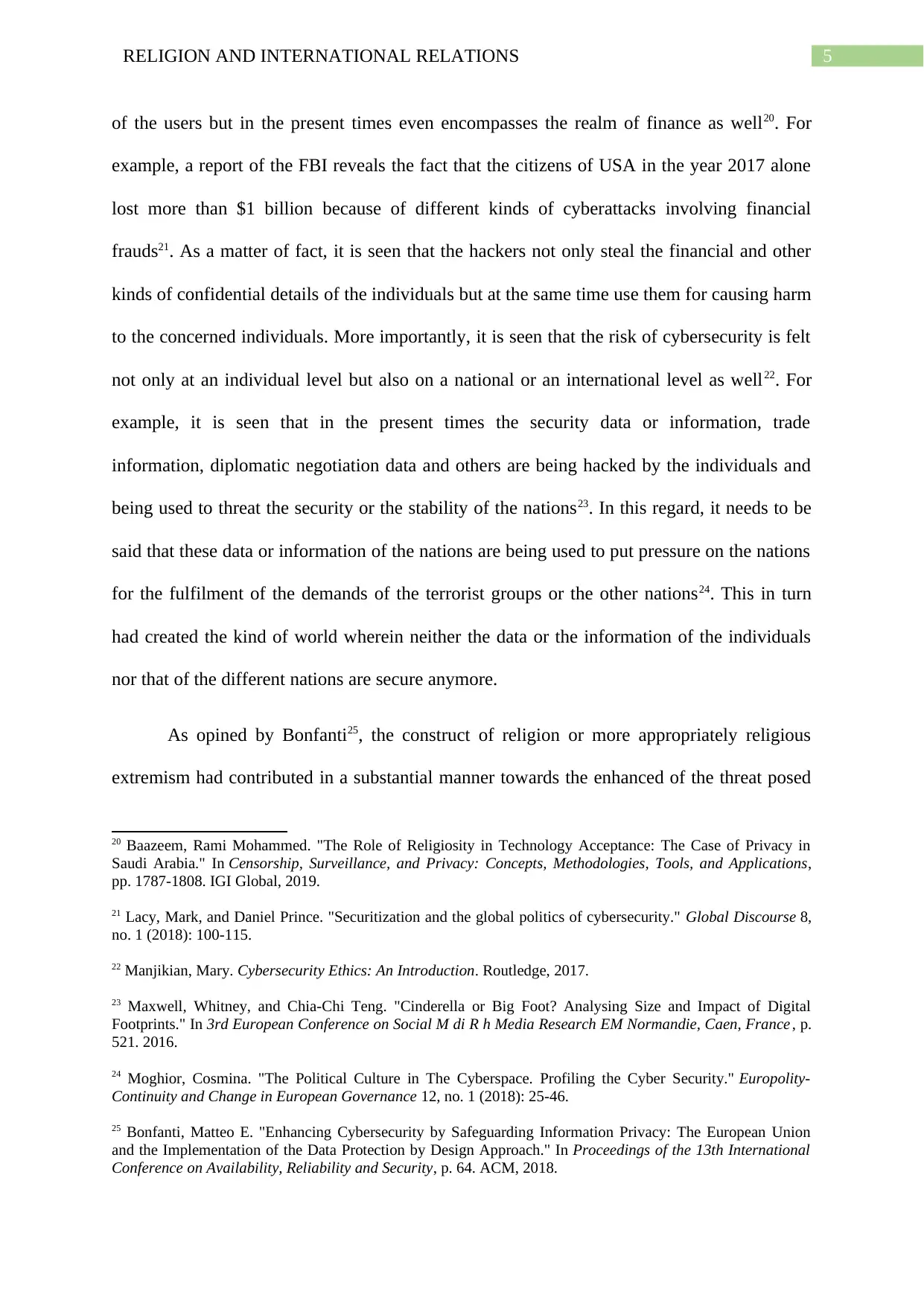
5RELIGION AND INTERNATIONAL RELATIONS
of the users but in the present times even encompasses the realm of finance as well20. For
example, a report of the FBI reveals the fact that the citizens of USA in the year 2017 alone
lost more than $1 billion because of different kinds of cyberattacks involving financial
frauds21. As a matter of fact, it is seen that the hackers not only steal the financial and other
kinds of confidential details of the individuals but at the same time use them for causing harm
to the concerned individuals. More importantly, it is seen that the risk of cybersecurity is felt
not only at an individual level but also on a national or an international level as well22. For
example, it is seen that in the present times the security data or information, trade
information, diplomatic negotiation data and others are being hacked by the individuals and
being used to threat the security or the stability of the nations23. In this regard, it needs to be
said that these data or information of the nations are being used to put pressure on the nations
for the fulfilment of the demands of the terrorist groups or the other nations24. This in turn
had created the kind of world wherein neither the data or the information of the individuals
nor that of the different nations are secure anymore.
As opined by Bonfanti25, the construct of religion or more appropriately religious
extremism had contributed in a substantial manner towards the enhanced of the threat posed
20 Baazeem, Rami Mohammed. "The Role of Religiosity in Technology Acceptance: The Case of Privacy in
Saudi Arabia." In Censorship, Surveillance, and Privacy: Concepts, Methodologies, Tools, and Applications,
pp. 1787-1808. IGI Global, 2019.
21 Lacy, Mark, and Daniel Prince. "Securitization and the global politics of cybersecurity." Global Discourse 8,
no. 1 (2018): 100-115.
22 Manjikian, Mary. Cybersecurity Ethics: An Introduction. Routledge, 2017.
23 Maxwell, Whitney, and Chia-Chi Teng. "Cinderella or Big Foot? Analysing Size and Impact of Digital
Footprints." In 3rd European Conference on Social M di R h Media Research EM Normandie, Caen, France , p.
521. 2016.
24 Moghior, Cosmina. "The Political Culture in The Cyberspace. Profiling the Cyber Security." Europolity-
Continuity and Change in European Governance 12, no. 1 (2018): 25-46.
25 Bonfanti, Matteo E. "Enhancing Cybersecurity by Safeguarding Information Privacy: The European Union
and the Implementation of the Data Protection by Design Approach." In Proceedings of the 13th International
Conference on Availability, Reliability and Security, p. 64. ACM, 2018.
of the users but in the present times even encompasses the realm of finance as well20. For
example, a report of the FBI reveals the fact that the citizens of USA in the year 2017 alone
lost more than $1 billion because of different kinds of cyberattacks involving financial
frauds21. As a matter of fact, it is seen that the hackers not only steal the financial and other
kinds of confidential details of the individuals but at the same time use them for causing harm
to the concerned individuals. More importantly, it is seen that the risk of cybersecurity is felt
not only at an individual level but also on a national or an international level as well22. For
example, it is seen that in the present times the security data or information, trade
information, diplomatic negotiation data and others are being hacked by the individuals and
being used to threat the security or the stability of the nations23. In this regard, it needs to be
said that these data or information of the nations are being used to put pressure on the nations
for the fulfilment of the demands of the terrorist groups or the other nations24. This in turn
had created the kind of world wherein neither the data or the information of the individuals
nor that of the different nations are secure anymore.
As opined by Bonfanti25, the construct of religion or more appropriately religious
extremism had contributed in a substantial manner towards the enhanced of the threat posed
20 Baazeem, Rami Mohammed. "The Role of Religiosity in Technology Acceptance: The Case of Privacy in
Saudi Arabia." In Censorship, Surveillance, and Privacy: Concepts, Methodologies, Tools, and Applications,
pp. 1787-1808. IGI Global, 2019.
21 Lacy, Mark, and Daniel Prince. "Securitization and the global politics of cybersecurity." Global Discourse 8,
no. 1 (2018): 100-115.
22 Manjikian, Mary. Cybersecurity Ethics: An Introduction. Routledge, 2017.
23 Maxwell, Whitney, and Chia-Chi Teng. "Cinderella or Big Foot? Analysing Size and Impact of Digital
Footprints." In 3rd European Conference on Social M di R h Media Research EM Normandie, Caen, France , p.
521. 2016.
24 Moghior, Cosmina. "The Political Culture in The Cyberspace. Profiling the Cyber Security." Europolity-
Continuity and Change in European Governance 12, no. 1 (2018): 25-46.
25 Bonfanti, Matteo E. "Enhancing Cybersecurity by Safeguarding Information Privacy: The European Union
and the Implementation of the Data Protection by Design Approach." In Proceedings of the 13th International
Conference on Availability, Reliability and Security, p. 64. ACM, 2018.
⊘ This is a preview!⊘
Do you want full access?
Subscribe today to unlock all pages.

Trusted by 1+ million students worldwide
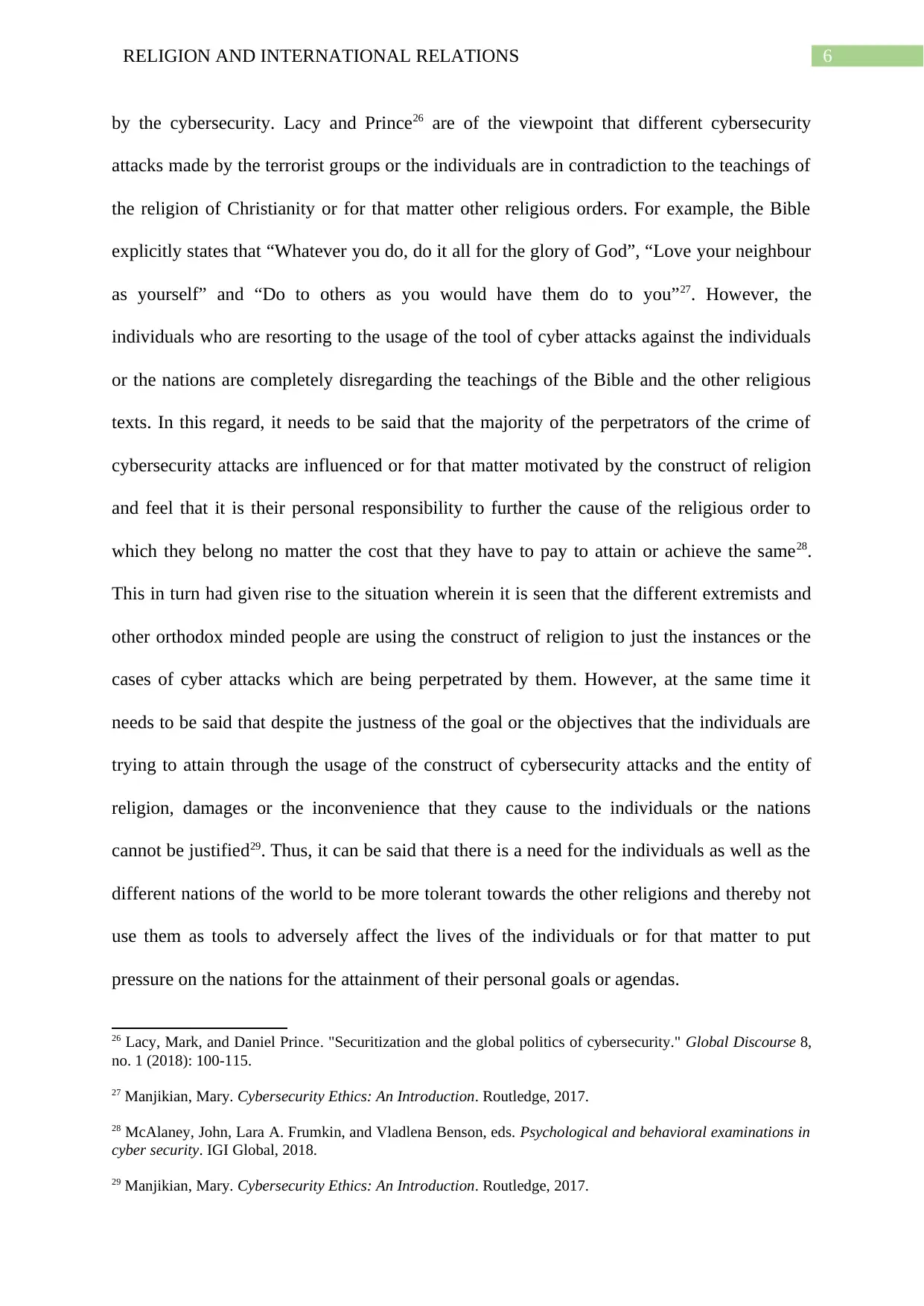
6RELIGION AND INTERNATIONAL RELATIONS
by the cybersecurity. Lacy and Prince26 are of the viewpoint that different cybersecurity
attacks made by the terrorist groups or the individuals are in contradiction to the teachings of
the religion of Christianity or for that matter other religious orders. For example, the Bible
explicitly states that “Whatever you do, do it all for the glory of God”, “Love your neighbour
as yourself” and “Do to others as you would have them do to you”27. However, the
individuals who are resorting to the usage of the tool of cyber attacks against the individuals
or the nations are completely disregarding the teachings of the Bible and the other religious
texts. In this regard, it needs to be said that the majority of the perpetrators of the crime of
cybersecurity attacks are influenced or for that matter motivated by the construct of religion
and feel that it is their personal responsibility to further the cause of the religious order to
which they belong no matter the cost that they have to pay to attain or achieve the same28.
This in turn had given rise to the situation wherein it is seen that the different extremists and
other orthodox minded people are using the construct of religion to just the instances or the
cases of cyber attacks which are being perpetrated by them. However, at the same time it
needs to be said that despite the justness of the goal or the objectives that the individuals are
trying to attain through the usage of the construct of cybersecurity attacks and the entity of
religion, damages or the inconvenience that they cause to the individuals or the nations
cannot be justified29. Thus, it can be said that there is a need for the individuals as well as the
different nations of the world to be more tolerant towards the other religions and thereby not
use them as tools to adversely affect the lives of the individuals or for that matter to put
pressure on the nations for the attainment of their personal goals or agendas.
26 Lacy, Mark, and Daniel Prince. "Securitization and the global politics of cybersecurity." Global Discourse 8,
no. 1 (2018): 100-115.
27 Manjikian, Mary. Cybersecurity Ethics: An Introduction. Routledge, 2017.
28 McAlaney, John, Lara A. Frumkin, and Vladlena Benson, eds. Psychological and behavioral examinations in
cyber security. IGI Global, 2018.
29 Manjikian, Mary. Cybersecurity Ethics: An Introduction. Routledge, 2017.
by the cybersecurity. Lacy and Prince26 are of the viewpoint that different cybersecurity
attacks made by the terrorist groups or the individuals are in contradiction to the teachings of
the religion of Christianity or for that matter other religious orders. For example, the Bible
explicitly states that “Whatever you do, do it all for the glory of God”, “Love your neighbour
as yourself” and “Do to others as you would have them do to you”27. However, the
individuals who are resorting to the usage of the tool of cyber attacks against the individuals
or the nations are completely disregarding the teachings of the Bible and the other religious
texts. In this regard, it needs to be said that the majority of the perpetrators of the crime of
cybersecurity attacks are influenced or for that matter motivated by the construct of religion
and feel that it is their personal responsibility to further the cause of the religious order to
which they belong no matter the cost that they have to pay to attain or achieve the same28.
This in turn had given rise to the situation wherein it is seen that the different extremists and
other orthodox minded people are using the construct of religion to just the instances or the
cases of cyber attacks which are being perpetrated by them. However, at the same time it
needs to be said that despite the justness of the goal or the objectives that the individuals are
trying to attain through the usage of the construct of cybersecurity attacks and the entity of
religion, damages or the inconvenience that they cause to the individuals or the nations
cannot be justified29. Thus, it can be said that there is a need for the individuals as well as the
different nations of the world to be more tolerant towards the other religions and thereby not
use them as tools to adversely affect the lives of the individuals or for that matter to put
pressure on the nations for the attainment of their personal goals or agendas.
26 Lacy, Mark, and Daniel Prince. "Securitization and the global politics of cybersecurity." Global Discourse 8,
no. 1 (2018): 100-115.
27 Manjikian, Mary. Cybersecurity Ethics: An Introduction. Routledge, 2017.
28 McAlaney, John, Lara A. Frumkin, and Vladlena Benson, eds. Psychological and behavioral examinations in
cyber security. IGI Global, 2018.
29 Manjikian, Mary. Cybersecurity Ethics: An Introduction. Routledge, 2017.
Paraphrase This Document
Need a fresh take? Get an instant paraphrase of this document with our AI Paraphraser
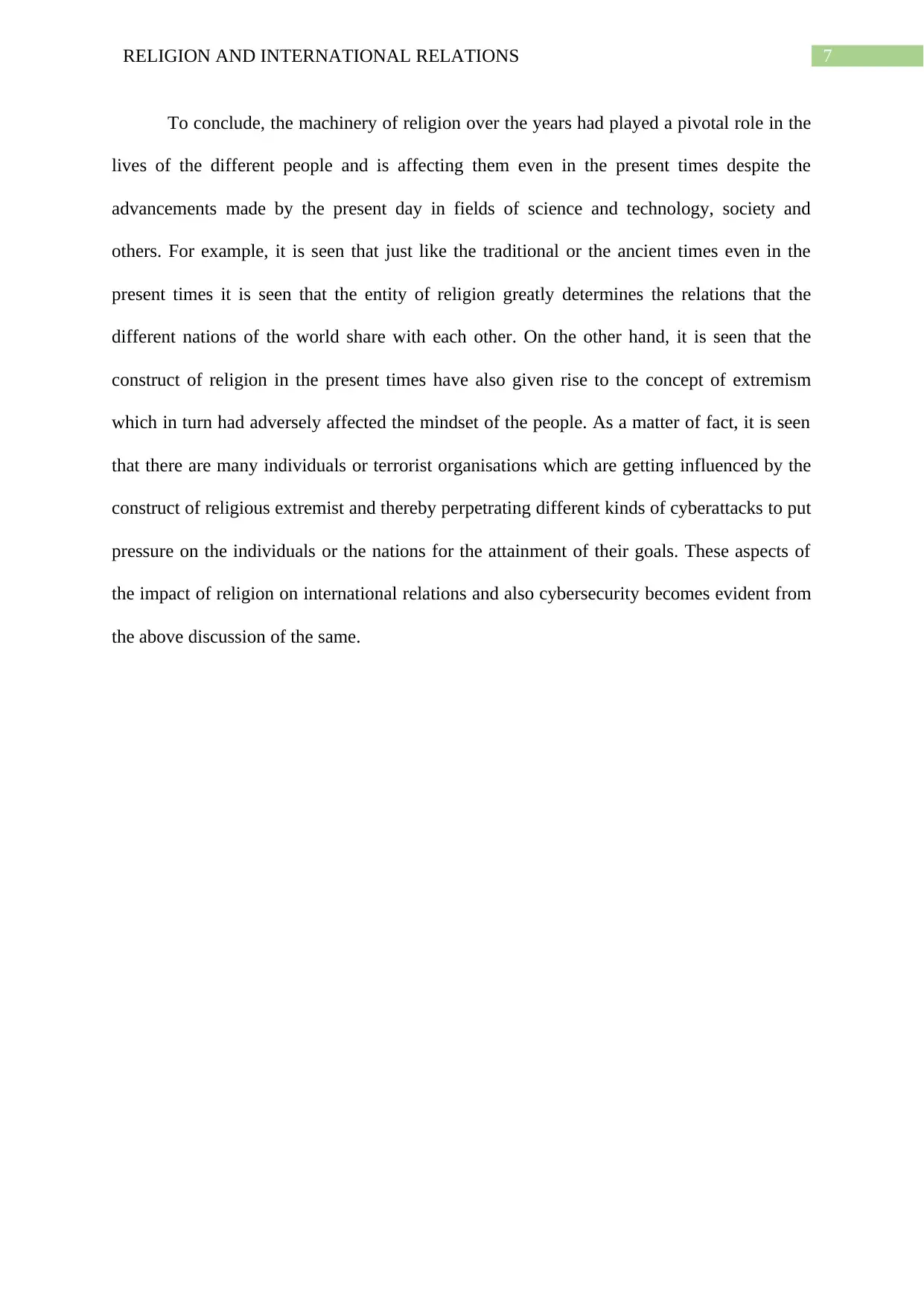
7RELIGION AND INTERNATIONAL RELATIONS
To conclude, the machinery of religion over the years had played a pivotal role in the
lives of the different people and is affecting them even in the present times despite the
advancements made by the present day in fields of science and technology, society and
others. For example, it is seen that just like the traditional or the ancient times even in the
present times it is seen that the entity of religion greatly determines the relations that the
different nations of the world share with each other. On the other hand, it is seen that the
construct of religion in the present times have also given rise to the concept of extremism
which in turn had adversely affected the mindset of the people. As a matter of fact, it is seen
that there are many individuals or terrorist organisations which are getting influenced by the
construct of religious extremist and thereby perpetrating different kinds of cyberattacks to put
pressure on the individuals or the nations for the attainment of their goals. These aspects of
the impact of religion on international relations and also cybersecurity becomes evident from
the above discussion of the same.
To conclude, the machinery of religion over the years had played a pivotal role in the
lives of the different people and is affecting them even in the present times despite the
advancements made by the present day in fields of science and technology, society and
others. For example, it is seen that just like the traditional or the ancient times even in the
present times it is seen that the entity of religion greatly determines the relations that the
different nations of the world share with each other. On the other hand, it is seen that the
construct of religion in the present times have also given rise to the concept of extremism
which in turn had adversely affected the mindset of the people. As a matter of fact, it is seen
that there are many individuals or terrorist organisations which are getting influenced by the
construct of religious extremist and thereby perpetrating different kinds of cyberattacks to put
pressure on the individuals or the nations for the attainment of their goals. These aspects of
the impact of religion on international relations and also cybersecurity becomes evident from
the above discussion of the same.
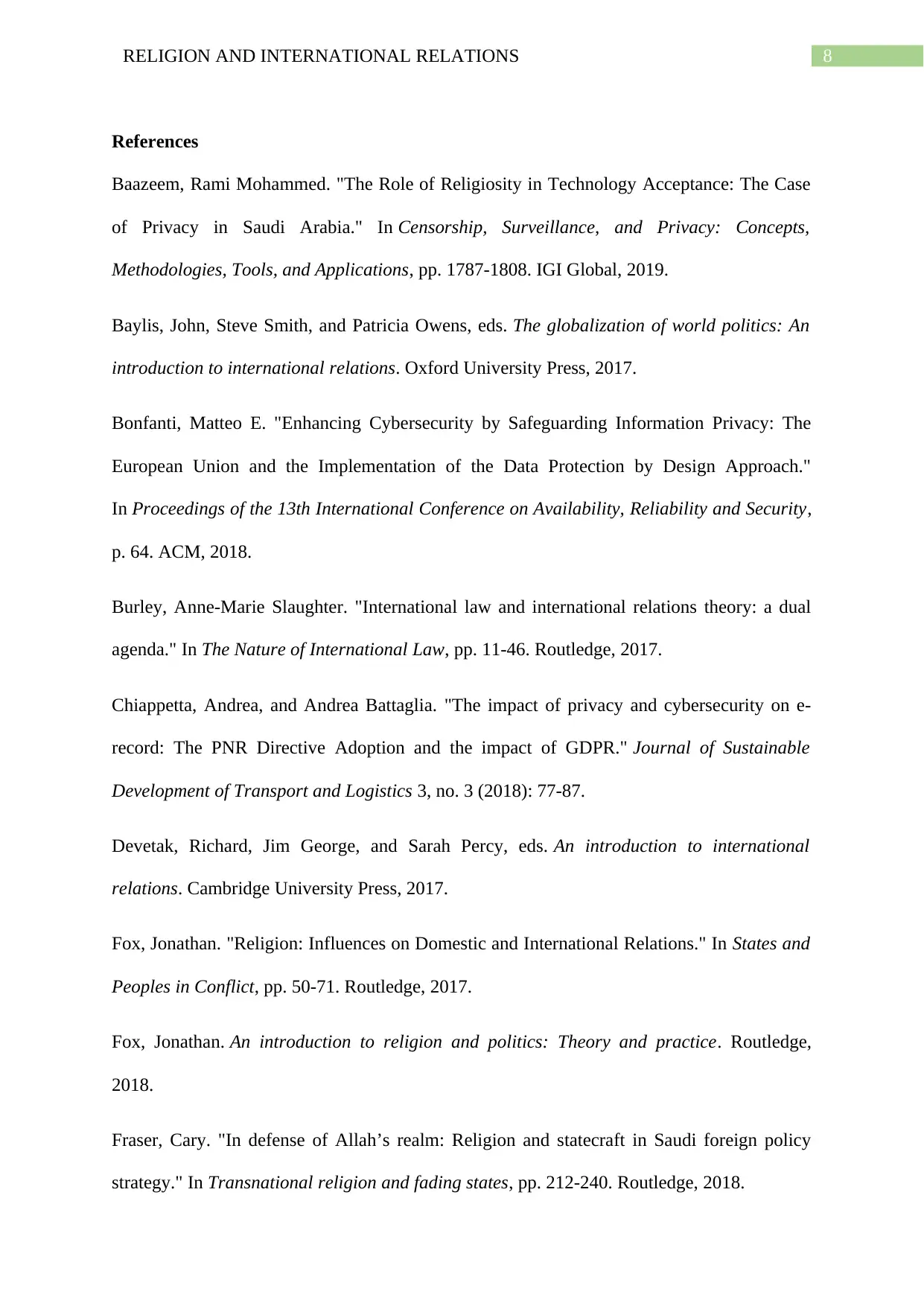
8RELIGION AND INTERNATIONAL RELATIONS
References
Baazeem, Rami Mohammed. "The Role of Religiosity in Technology Acceptance: The Case
of Privacy in Saudi Arabia." In Censorship, Surveillance, and Privacy: Concepts,
Methodologies, Tools, and Applications, pp. 1787-1808. IGI Global, 2019.
Baylis, John, Steve Smith, and Patricia Owens, eds. The globalization of world politics: An
introduction to international relations. Oxford University Press, 2017.
Bonfanti, Matteo E. "Enhancing Cybersecurity by Safeguarding Information Privacy: The
European Union and the Implementation of the Data Protection by Design Approach."
In Proceedings of the 13th International Conference on Availability, Reliability and Security,
p. 64. ACM, 2018.
Burley, Anne-Marie Slaughter. "International law and international relations theory: a dual
agenda." In The Nature of International Law, pp. 11-46. Routledge, 2017.
Chiappetta, Andrea, and Andrea Battaglia. "The impact of privacy and cybersecurity on e-
record: The PNR Directive Adoption and the impact of GDPR." Journal of Sustainable
Development of Transport and Logistics 3, no. 3 (2018): 77-87.
Devetak, Richard, Jim George, and Sarah Percy, eds. An introduction to international
relations. Cambridge University Press, 2017.
Fox, Jonathan. "Religion: Influences on Domestic and International Relations." In States and
Peoples in Conflict, pp. 50-71. Routledge, 2017.
Fox, Jonathan. An introduction to religion and politics: Theory and practice. Routledge,
2018.
Fraser, Cary. "In defense of Allah’s realm: Religion and statecraft in Saudi foreign policy
strategy." In Transnational religion and fading states, pp. 212-240. Routledge, 2018.
References
Baazeem, Rami Mohammed. "The Role of Religiosity in Technology Acceptance: The Case
of Privacy in Saudi Arabia." In Censorship, Surveillance, and Privacy: Concepts,
Methodologies, Tools, and Applications, pp. 1787-1808. IGI Global, 2019.
Baylis, John, Steve Smith, and Patricia Owens, eds. The globalization of world politics: An
introduction to international relations. Oxford University Press, 2017.
Bonfanti, Matteo E. "Enhancing Cybersecurity by Safeguarding Information Privacy: The
European Union and the Implementation of the Data Protection by Design Approach."
In Proceedings of the 13th International Conference on Availability, Reliability and Security,
p. 64. ACM, 2018.
Burley, Anne-Marie Slaughter. "International law and international relations theory: a dual
agenda." In The Nature of International Law, pp. 11-46. Routledge, 2017.
Chiappetta, Andrea, and Andrea Battaglia. "The impact of privacy and cybersecurity on e-
record: The PNR Directive Adoption and the impact of GDPR." Journal of Sustainable
Development of Transport and Logistics 3, no. 3 (2018): 77-87.
Devetak, Richard, Jim George, and Sarah Percy, eds. An introduction to international
relations. Cambridge University Press, 2017.
Fox, Jonathan. "Religion: Influences on Domestic and International Relations." In States and
Peoples in Conflict, pp. 50-71. Routledge, 2017.
Fox, Jonathan. An introduction to religion and politics: Theory and practice. Routledge,
2018.
Fraser, Cary. "In defense of Allah’s realm: Religion and statecraft in Saudi foreign policy
strategy." In Transnational religion and fading states, pp. 212-240. Routledge, 2018.
⊘ This is a preview!⊘
Do you want full access?
Subscribe today to unlock all pages.

Trusted by 1+ million students worldwide
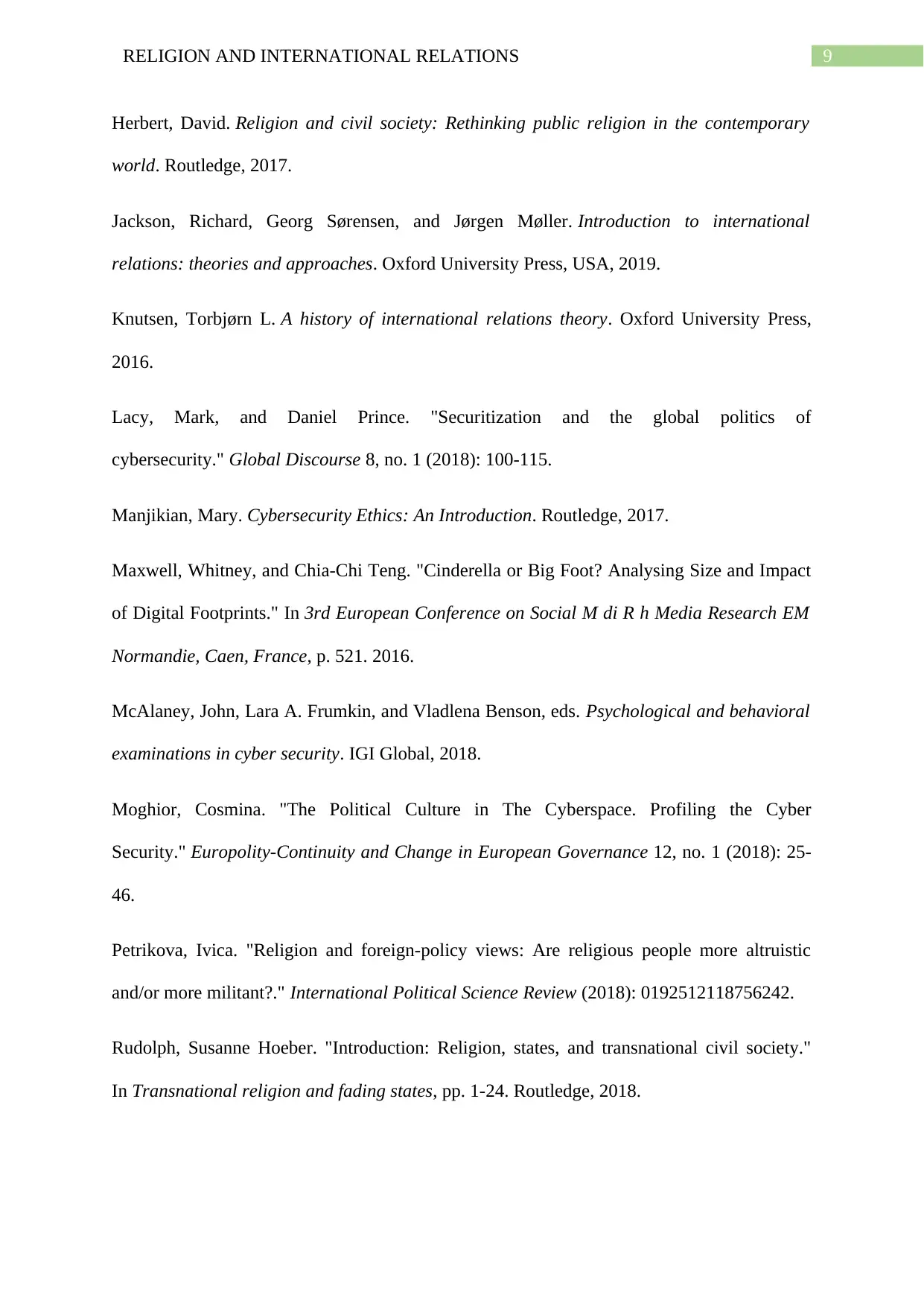
9RELIGION AND INTERNATIONAL RELATIONS
Herbert, David. Religion and civil society: Rethinking public religion in the contemporary
world. Routledge, 2017.
Jackson, Richard, Georg Sørensen, and Jørgen Møller. Introduction to international
relations: theories and approaches. Oxford University Press, USA, 2019.
Knutsen, Torbjørn L. A history of international relations theory. Oxford University Press,
2016.
Lacy, Mark, and Daniel Prince. "Securitization and the global politics of
cybersecurity." Global Discourse 8, no. 1 (2018): 100-115.
Manjikian, Mary. Cybersecurity Ethics: An Introduction. Routledge, 2017.
Maxwell, Whitney, and Chia-Chi Teng. "Cinderella or Big Foot? Analysing Size and Impact
of Digital Footprints." In 3rd European Conference on Social M di R h Media Research EM
Normandie, Caen, France, p. 521. 2016.
McAlaney, John, Lara A. Frumkin, and Vladlena Benson, eds. Psychological and behavioral
examinations in cyber security. IGI Global, 2018.
Moghior, Cosmina. "The Political Culture in The Cyberspace. Profiling the Cyber
Security." Europolity-Continuity and Change in European Governance 12, no. 1 (2018): 25-
46.
Petrikova, Ivica. "Religion and foreign-policy views: Are religious people more altruistic
and/or more militant?." International Political Science Review (2018): 0192512118756242.
Rudolph, Susanne Hoeber. "Introduction: Religion, states, and transnational civil society."
In Transnational religion and fading states, pp. 1-24. Routledge, 2018.
Herbert, David. Religion and civil society: Rethinking public religion in the contemporary
world. Routledge, 2017.
Jackson, Richard, Georg Sørensen, and Jørgen Møller. Introduction to international
relations: theories and approaches. Oxford University Press, USA, 2019.
Knutsen, Torbjørn L. A history of international relations theory. Oxford University Press,
2016.
Lacy, Mark, and Daniel Prince. "Securitization and the global politics of
cybersecurity." Global Discourse 8, no. 1 (2018): 100-115.
Manjikian, Mary. Cybersecurity Ethics: An Introduction. Routledge, 2017.
Maxwell, Whitney, and Chia-Chi Teng. "Cinderella or Big Foot? Analysing Size and Impact
of Digital Footprints." In 3rd European Conference on Social M di R h Media Research EM
Normandie, Caen, France, p. 521. 2016.
McAlaney, John, Lara A. Frumkin, and Vladlena Benson, eds. Psychological and behavioral
examinations in cyber security. IGI Global, 2018.
Moghior, Cosmina. "The Political Culture in The Cyberspace. Profiling the Cyber
Security." Europolity-Continuity and Change in European Governance 12, no. 1 (2018): 25-
46.
Petrikova, Ivica. "Religion and foreign-policy views: Are religious people more altruistic
and/or more militant?." International Political Science Review (2018): 0192512118756242.
Rudolph, Susanne Hoeber. "Introduction: Religion, states, and transnational civil society."
In Transnational religion and fading states, pp. 1-24. Routledge, 2018.
Paraphrase This Document
Need a fresh take? Get an instant paraphrase of this document with our AI Paraphraser
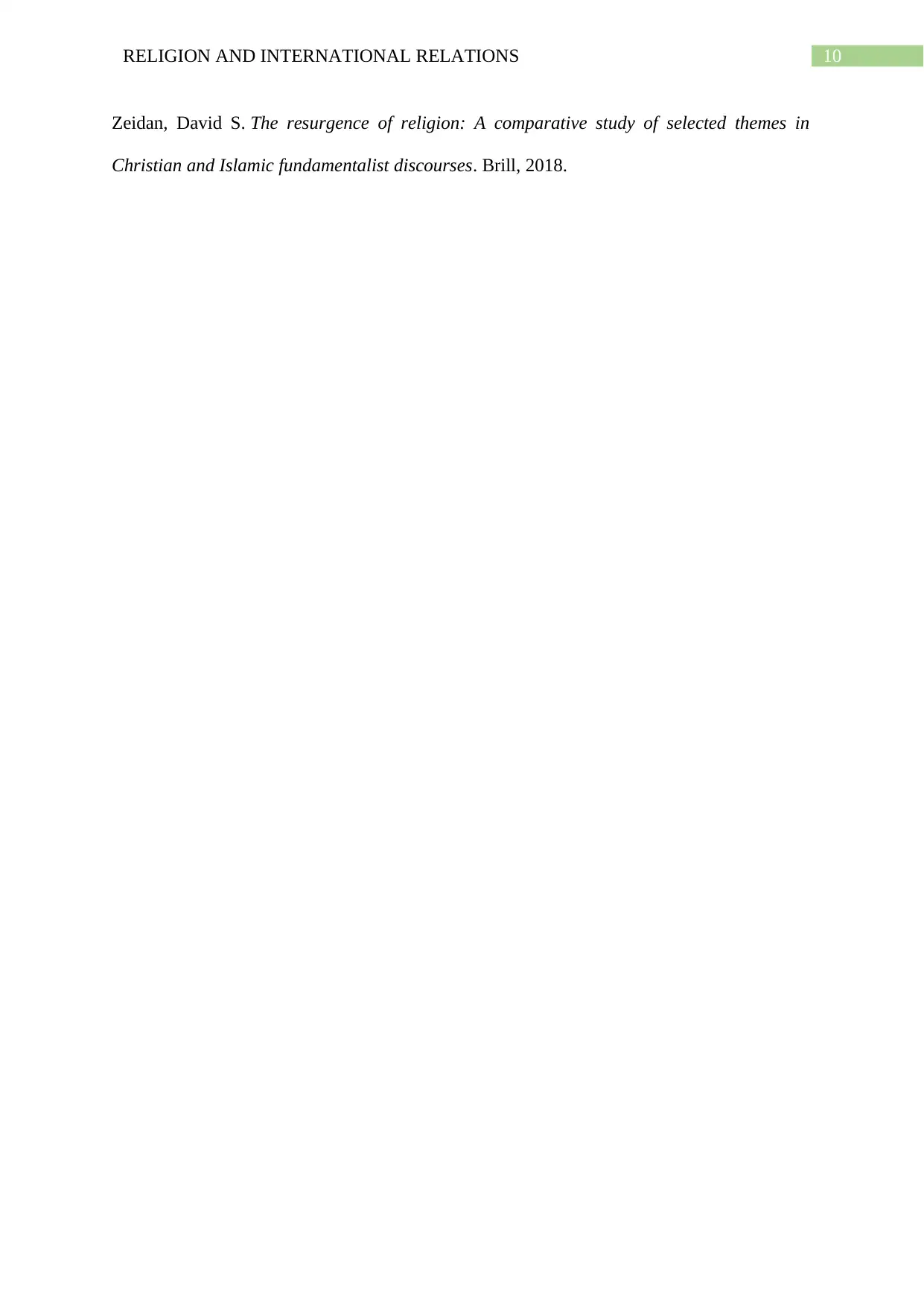
10RELIGION AND INTERNATIONAL RELATIONS
Zeidan, David S. The resurgence of religion: A comparative study of selected themes in
Christian and Islamic fundamentalist discourses. Brill, 2018.
Zeidan, David S. The resurgence of religion: A comparative study of selected themes in
Christian and Islamic fundamentalist discourses. Brill, 2018.
1 out of 11
Related Documents
Your All-in-One AI-Powered Toolkit for Academic Success.
+13062052269
info@desklib.com
Available 24*7 on WhatsApp / Email
![[object Object]](/_next/static/media/star-bottom.7253800d.svg)
Unlock your academic potential
Copyright © 2020–2026 A2Z Services. All Rights Reserved. Developed and managed by ZUCOL.





